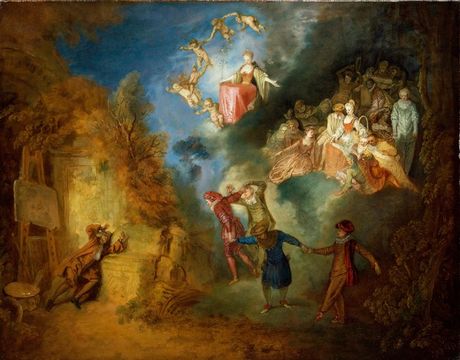
The UK government has placed an export bar on a painting by the Rococo pioneer Jean-Antoine Watteau (1684-1721) that once hung in No.10 Downing Street—marking the second time in recent days that the primisterial residence’s paintings have made headlines. The early 18th-century work, entitled Le Rêve de L’Artiste, has been valued at £6,075,000 (plus £215,020 VAT).
The export bar, which allows time for a UK gallery or institution to acquire the painting, will expire on 29 November. Otherwise the work is “at risk of leaving the UK unless a domestic buyer can be found to save it for the nation”, says a statement from the UK government’s Department for Culture, Media and Sport (DCMS).
The painting was bought in 1736 by the first Prime Minister of Great Britain, Robert Walpole, and was displayed in Lady Walpole’s dressing room in Downing Street for the remaining years of his administration, according to a DCMS statement.
The work features in A Catalogue of the Right Honourable Sir Robert Walpole’s Collection of Pictures, where it is described as: “‘Watteau—A dream of Watteau’s, Himself asleep by a rock; Several Dancers & Grotesque figures in the Clouds’.”
The painting was sold at Sotheby’s New York in 1959 for £1,200 on behalf of the gallery Wildenstein & Co. and was sold again in 1963 via the dealer Dudley Tooth of the London-based gallery, Arthur Tooth & Sons. It has been in a private collection since 1993.
“[The painting] gives us a fascinating insight not only into Watteau’s thinking as a painter but into wider 18th-century concepts of inspiration and imagination,” says Mark Hallett, a member of the Reviewing Committee on the Export of Works of Art and Objects of Cultural Interest and a former director of the Courtauld Institute of Art in London.
“As such, Le Rêve de l’Artiste has a special, almost unique status in the artist’s output. This is a work that cries out for further research, interpretation and appreciation, and that fully deserves being retained for the nation.”
The Wallace Collection in London owns eight works by Watteau including Voulez-vous triompher des belles? (around 1714–17). The collection’s website says that Watteau is “best remembered as the painter of a form of painting that we now know as the fête galante. We tend to describe his compositions as dreamlike depictions of beautifully-dressed aristocrats at play in lush parkland settings.”


